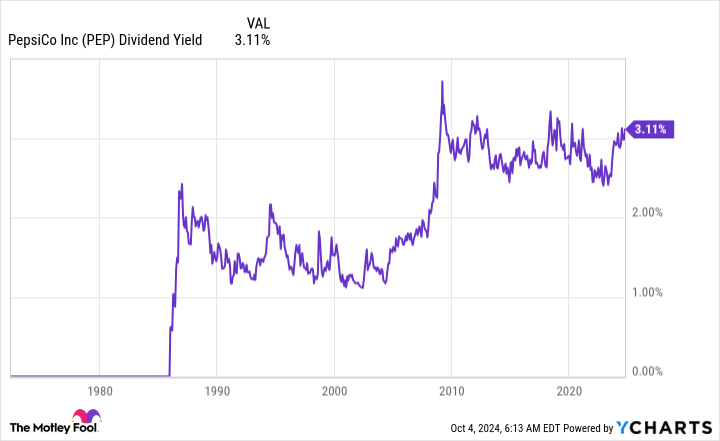PepsiCo (NASDAQ: PEP) is best known for its soda products and snacking options under the Frito-Lay brand. It is a powerful partner as retailers look to attract customers into their stores. And the company just got a little bit better after announcing plans to buy Siete Foods for $1.2 billion, even though Wall Street barely noticed the deal. Here’s why the acquisition is so important.
What does PepsiCo do?
PepsiCo’s name would suggest it’s a beverage maker, which it is. But it’s so much more than that. It is really a food conglomerate, with brands that span from beverages (Pepsi) to salty snacks (Frito-Lay) to packed food (Quaker Oats). And those are just a few of its iconic brands; it also owns Gatorade, Doritos, Tostitos, Muscle Milk, Smartfood, and Near East, among many others. It is a vital partner to retailers and convenience stores around the world.


The company’s scale is impressive, with a market cap of roughly $230 billion. Revenues in 2023 tallied up to roughly $91.5 billion. You can find its brands in over 200 countries and territories around the world. Its distribution and marketing prowess is exceptional and it is easily one of the largest and most powerful consumer staples companies on Wall Street.
Investors should find the company very attractive in general. But right now it also looks reasonably attractive, valuation wise. PepsiCo’s price-to-sales, price-to-earnings, price-to-book value, and price-to-cash flow ratios are all below their five-year averages. The stock’s 3.2% dividend yield is toward the high end of its historical yield range. The yield is also notably higher than that of the 2.6% average yield of consumer staples sector, using the Consumer Staples Select Sector SPDR ETF (NYSEMKT: XLP) as an industry proxy. Simply put, PepsiCo looks fairly priced, if not a little cheap, right now.


From a basic level, then, dividend investors should probably be looking at PepsiCo, noting that it has increased its dividend annually for an impressive 52 consecutive years. That, for reference, makes it a Dividend King.
What about PepsiCo’s Siete acquisition?
With PepsiCo’s many powerful brands and massive sales base, it is understandable that Wall Street didn’t get excited about its $1.2 billion deal to acquire Siete Brands. The stock has basically gone nowhere since the deal was announced. And just to put a number on this, Siete is estimated to have revenues of around $500 million, which is less than 1% of PepsiCo’s 2023 revenues.
So this is a small transaction that won’t really move the needle for PepsiCo. But it appears to be attractively priced, at around 2.4 times sales, so PepsiCo isn’t overpaying. And the financially strong company should have little problem coming up with the cash to pay for Siete. Thus there’s little concern that the deal will lead to any financial disruption at PepsiCo. In many ways it is kind of a non-event.
But strategically, it is vitally important. If you examine the full list of brands that PepsiCo owns, including some of its largest and most important nameplates, it simply didn’t create them all. It bought them. Gatorade is a great example, as the brand was the crown jewel of Quaker Oats when PepsiCo bought that company. It is one of the most dominant sports drink brands and catapulted PepsiCo to the head of that product niche at a time when PepsiCo’s own offerings there were lacking. This isn’t to suggest the Siete is the next Gatorade. It isn’t. However, the approach taken with Gatorade is basically the same one that’s being taken with Siete.
There’s overlap between what Siete produces and what Pepsico makes, most notably in the chip category. But Siete, a self described Mexican-American food company, also has offerings in the sauce, seasoning, bean, tortilla, taco shell, and sweets areas. It helps expand Pepsico’s reach in areas it already competes and, perhaps, even pushes the company a bit further into the hispanic food category.
PepsiCo is buying a strong, up-and-coming brand that it can use to grow its overall business. Just plugging Siete into PepsiCo’s powerful marketing and distribution systems will likely expand its sales. More importantly, it gives PepsiCo even more reach in the salty snack food segment. Although not a huge deal in and of itself, this bolt-on acquisition approach is how PepsiCo built its dominant position and how it maintains it over time.
No big deal and yet a very big deal
PepsiCo’s Siete acquisition isn’t likely to immediately move the needle for the company, which is why investors didn’t pay all that much attention. But if you think in decades and not days, the deal represents the winning business approach that PepsiCo has used for decades to expand its business — and, just as important, to reward dividend investors well along the way. If you are a dividend investor, Siete is just one more reason to like PepsiCo while its stock appears to be on the sale rack.
Don’t miss this second chance at a potentially lucrative opportunity
Ever feel like you missed the boat in buying the most successful stocks? Then you’ll want to hear this.
On rare occasions, our expert team of analysts issues a “Double Down” stock recommendation for companies that they think are about to pop. If you’re worried you’ve already missed your chance to invest, now is the best time to buy before it’s too late. And the numbers speak for themselves:
-
Amazon: if you invested $1,000 when we doubled down in 2010, you’d have $20,855!*
-
Apple: if you invested $1,000 when we doubled down in 2008, you’d have $43,423!*
-
Netflix: if you invested $1,000 when we doubled down in 2004, you’d have $392,297!*
Right now, we’re issuing “Double Down” alerts for three incredible companies, and there may not be another chance like this anytime soon.
See 3 “Double Down” stocks »
*Stock Advisor returns as of October 7, 2024
Reuben Gregg Brewer has no position in any of the stocks mentioned. The Motley Fool has no position in any of the stocks mentioned. The Motley Fool has a disclosure policy.
PepsiCo’s $1.2 Billion Siete Purchase: The Underrated Move Shaping Its Future was originally published by The Motley Fool
